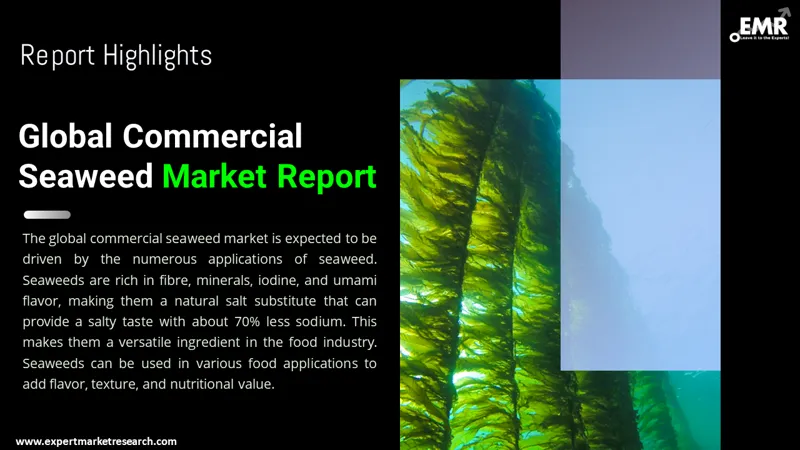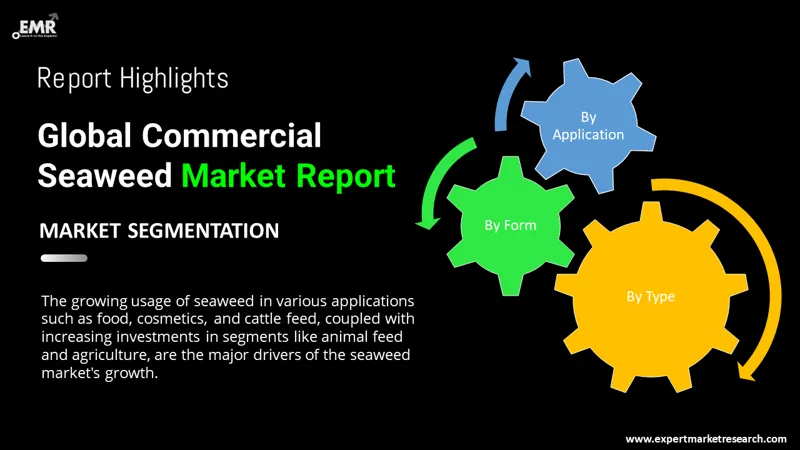
Consumer Insights
Uncover trends and behaviors shaping consumer choices today
Procurement Insights
Optimize your sourcing strategy with key market data
Industry Stats
Stay ahead with the latest trends and market analysis.
The global Commercial Seaweed market is expected to grow at a CAGR of 9.80% during the period 2026-2035. Seaweeds are used as a food source (in several coastal regions), in industrial applications and as fertiliser. Present uses of seaweed include foods for human consumption, animal feed, cosmetics, fertilisers, and for the extraction of industrial gums and chemicals. Asia, in particular Japan, Korea and China, are key producers and consumers of seaweed. North America and Europe are markets with significant potential.
Base Year
Historical Period
Forecast Period
Compound Annual Growth Rate
9.8%
2026-2035
*this image is indicative*
| Global Commercial Seaweed Market Report Summary | Description | Value |
| Base Year | USD Billion | 2025 |
| Historical Period | USD Billion | 2019-2025 |
| Forecast Period | USD Billion | 2026-2035 |
| Market Size 2025 | USD Billion | XX |
| Market Size 2035 | USD Billion | XX |
| CAGR 2019-2025 | Percentage | XX% |
| CAGR 2026-2035 | Percentage | 9.80% |
| CAGR 2026-2035 - Market by Region | Asia Pacific | 10.8% |
| CAGR 2026-2035 - Market by Country | Brazil | 11.0% |
| CAGR 2026-2035 - Market by Country | China | 10.5% |
| CAGR 2026-2035 - Market by Type | Red Seaweed | 10.6% |
| CAGR 2026-2035 - Market by Form | Liquid | 10.9% |
| Market Share by Country 2025 | Mexico | 2.1% |
The seaweed industry offers several products with an estimated total annual value over US$ 5 billion. Key uses include those in human consumption, substances extracted from seaweeds (such as hydrocolloids), and fertilizers and animal feed additives. The farming of seaweed has seen rapid expansion as demand outdid the supply presented by natural resources. Commercial harvesting occurs in over thirty countries across the Northern and Southern Hemispheres, in waters ranging from cold, temperate, to tropical. Such increase in demand is expected to boost the global commercial seaweed market. Broadly, seaweeds are classified as brown (Phaeophyceae), red (Rhodophyceae) and green (Chlorophyceae), on the basis of pigmentation. Seaweeds are also known as macro-algae; as compared to micro-algae (Cyanophyceae) that are microscopic in size, generally unicellular, and best identified by the blue-green algae that sometimes blossom and contaminate streams and rivers. Seaweeds that grow naturally are often known as wild seaweeds, as against seaweeds that are cultivated or farmed.

Read more about this report - REQUEST FREE SAMPLE COPY IN PDF
Asia explains over ninety percent of seaweed production. Seaweed cultivation is also growing in Europe. China, Japan and Korea are the largest consumers of seaweed as food. However, the market has seen expansion with rising demand in regions like USA and South America. Indeed, demand has risen such that has outdone supply capabilities from natural (or wild) stocks. Increasing interest and research into seaweeds has enabled the development of cultivation industries that fulfil a major percentage of the market demand. Ireland, Iceland, Canada, France have also witnessed the development of the market, with seaweed being consumed in restaurants as well as in homes. In some developing nations, an informal market exists among coastal inhabitants where fresh seaweeds are consumed as vegetable and in salads.
Red and brown seaweeds are used in the production of three hydrocolloids - agar, alginate and carrageenan. Hydrocolloids are non-crystalline substances with very large molecules and that dissolve in water to give a viscous solution. Alginate, agar and carrageenan are carbohydrates that are soluble in water and used to thicken aqueous solutions, prepare gels, manufacture water-soluble films, and stabilize certain products (such as ice cream).
Seaweeds have several applications that are expected to drive the global commercial seaweed market. Rich in fibre, minerals, iodine and umami flavour, seaweeds are a natural salt substitute, offering a salty taste with about 70% less sodium. Seaweed may be used in food in several ways.
Seaweeds are a good source of protein, fibre and bioactive compounds that exert positive effects on gut microflora. Seaweed can enhance nutritional value, including iodine, of meat and dairy products, and increase tenderness and storage stability, with no negative effect on flavour. Kelp for cattle can decrease methane in livestock, cutting down greenhouse gas emissions.
Seaweed bioplastics degrade quickly and do not carry micro-plastics and toxic chemicals. These may be employed to manufacture sealable films, sachets, bags, nets and other items. Seaweeds help decrease energy and water consumption by the textile industry, producing durable fabrics that may be readily recycled. Seaweeds are also used in many cosmetic items, nutraceuticals, and medicines.

Read more about this report - REQUEST FREE SAMPLE COPY IN PDF
The EMR’s report titled “Commercial Seaweed Market Report and Forecast 2026-2035” offers a detailed analysis of the market based on the following segments:
By type, the market is segmented into:
By form, the market is divided into:
By application, the market is classified into:
By region the market is segmented into:
| CAGR 2026-2035 - Market by | Country |
| Brazil | 11.0% |
| China | 10.5% |
| UK | 9.4% |
| Australia | 9.4% |
| USA | 9.3% |
| Canada | XX% |
| Germany | 9.1% |
| France | XX% |
| Italy | XX% |
| Japan | XX% |
| India | XX% |
| Saudi Arabia | XX% |
| Mexico | XX% |
The report presents a detailed analysis of the following key players in the global commercial seaweed market, looking into their capacity, and latest developments like capacity expansions, plant turnarounds, and mergers and acquisitions:
The EMR report gives an in-depth insight into the industry by providing a SWOT analysis as well as an analysis of Porter’s Five Forces model.




*While we strive to always give you current and accurate information, the numbers depicted on the website are indicative and may differ from the actual numbers in the main report. At Expert Market Research, we aim to bring you the latest insights and trends in the market. Using our analyses and forecasts, stakeholders can understand the market dynamics, navigate challenges, and capitalize on opportunities to make data-driven strategic decisions.*
Get in touch with us for a customized solution tailored to your unique requirements and save upto 35%!
The global commercial seaweed market is projected to grow at a CAGR of 9.80% between 2026 and 2035.
The major drivers of the market include the growing technological developments in cultivating seaweed, growing consumer awareness regarding the benefits of nutritional food, increasing product demand in the regional food industry, and rising consumption of organic and non-GMO ingredients.
The multiple applications of seaweed, including food, cattle feed and cosmetics and the rising investments in application segments, including animal feed and agriculture are the key industry trends propelling the market's growth.
The major regions in the industry are North America, Latin America, the Middle East and Africa, Europe, and the Asia Pacific.
The different types of commercial seaweed are brown seaweed, red seaweed, and green seaweed, among others.
Based on form, the market is classified into liquid and powdered, among others.
The major applications of the market are agriculture, animal feed, food and beverages, among others.
Seaweeds are used as human foods, cosmetics, fertilisers, and to extract industrial chemicals and gums. They may be utilised as a source of long- and short-chain compounds for both industrial and medical applications.
Off the shores of China, Indonesia, the Philippines, South Korea, and Japan, vast sea-based farms produce a significant portion of the world's seaweed. Most of this seaweed is dried (or occasionally blanched) and used for food, animal feed, and industrial uses like thickeners for toothpaste.
Red seaweeds are an excellent vegetarian source of complete protein since they have all the key amino acids that the body needs. Iodine, which supports healthy thyroid function, can also be found in red seaweeds.
The major players in the industry are Cargill, Incorporated., Seasol International Pty Ltd., Indigrow Ltd., IFF Nutrition & Biosciences (Dupont), and Acadian Seaplants Limited, among others.
Explore our key highlights of the report and gain a concise overview of key findings, trends, and actionable insights that will empower your strategic decisions.
| REPORT FEATURES | DETAILS |
| Base Year | 2025 |
| Historical Period | 2019-2025 |
| Forecast Period | 2026-2035 |
| Scope of the Report |
Historical and Forecast Trends, Industry Drivers and Constraints, Historical and Forecast Market Analysis by Segment:
|
| Breakup by Type |
|
| Breakup by Form |
|
| Breakup by Application |
|
| Breakup by Region |
|
| Market Dynamics |
|
| Trade Data Analysis |
|
| Price Analysis |
|
| Competitive Landscape |
|
| Companies Covered |
|
| Report Price and Purchase Option | Explore our purchase options that are best suited to your resources and industry needs. |
| Delivery Format | Delivered as an attached PDF and Excel through email, with an option of receiving an editable PPT, according to the purchase option. |
Datasheet
One User
USD 2,499
USD 2,249
tax inclusive*
Single User License
One User
USD 3,999
USD 3,599
tax inclusive*
Five User License
Five User
USD 4,999
USD 4,249
tax inclusive*
Corporate License
Unlimited Users
USD 5,999
USD 5,099
tax inclusive*
*Please note that the prices mentioned below are starting prices for each bundle type. Kindly contact our team for further details.*
Flash Bundle
Small Business Bundle
Growth Bundle
Enterprise Bundle
*Please note that the prices mentioned below are starting prices for each bundle type. Kindly contact our team for further details.*
Flash Bundle
Number of Reports: 3
20%
tax inclusive*
Small Business Bundle
Number of Reports: 5
25%
tax inclusive*
Growth Bundle
Number of Reports: 8
30%
tax inclusive*
Enterprise Bundle
Number of Reports: 10
35%
tax inclusive*
How To Order

Select License Type
Choose the right license for your needs and access rights.

Click on ‘Buy Now’
Add the report to your cart with one click and proceed to register.

Select Mode of Payment
Choose a payment option for a secure checkout. You will be redirected accordingly.
Gain insights to stay ahead and seize opportunities.

Get insights & trends for a competitive edge.

Track prices with detailed trend reports.

Analyse trade data for supply chain insights.

Leverage cost reports for smart savings

Enhance supply chain with partnerships.

Connect For More Information
Our expert team of analysts will offer full support and resolve any queries regarding the report, before and after the purchase.
Our expert team of analysts will offer full support and resolve any queries regarding the report, before and after the purchase.
We employ meticulous research methods, blending advanced analytics and expert insights to deliver accurate, actionable industry intelligence, staying ahead of competitors.
Our skilled analysts offer unparalleled competitive advantage with detailed insights on current and emerging markets, ensuring your strategic edge.
We offer an in-depth yet simplified presentation of industry insights and analysis to meet your specific requirements effectively.
Share